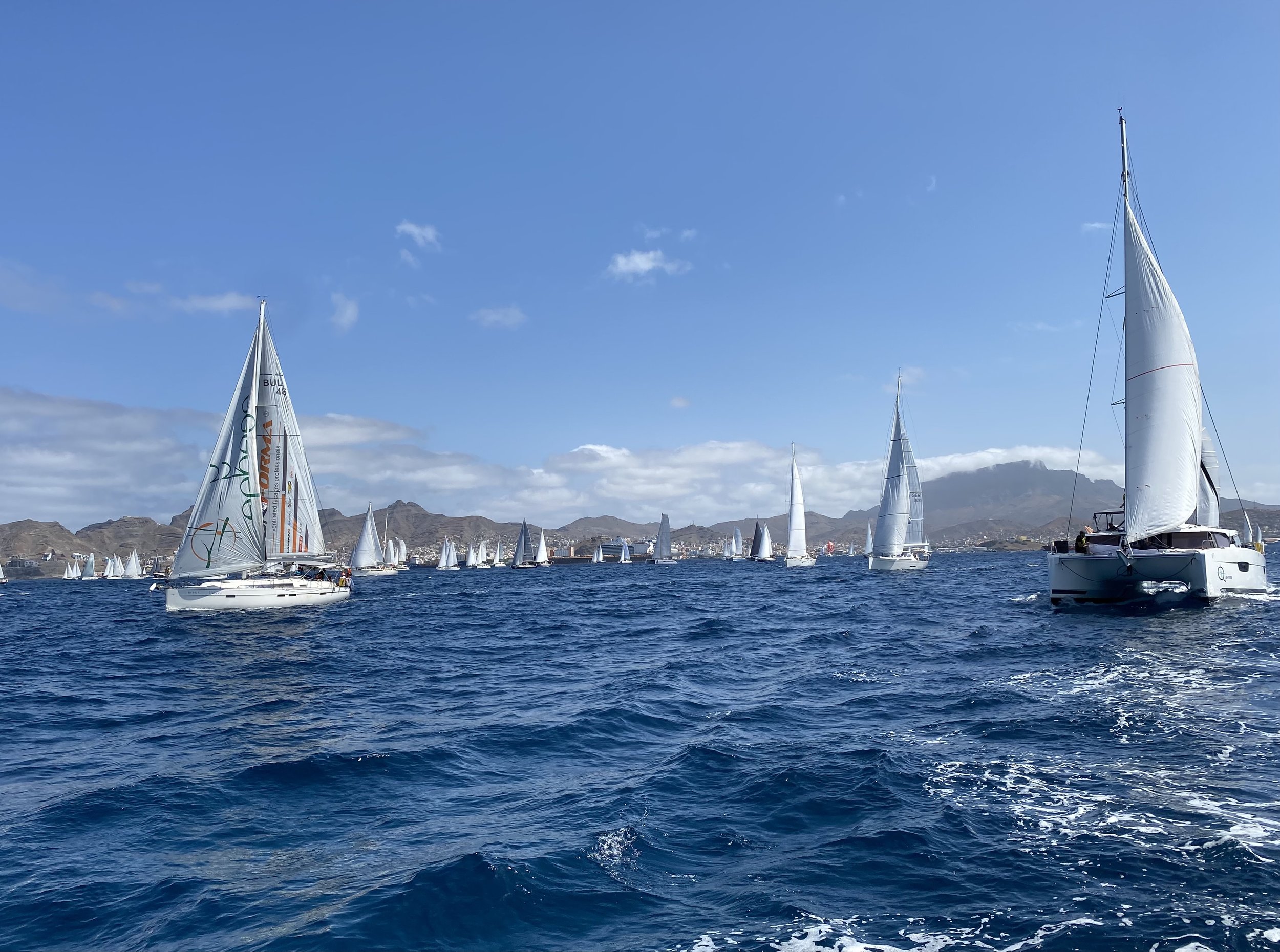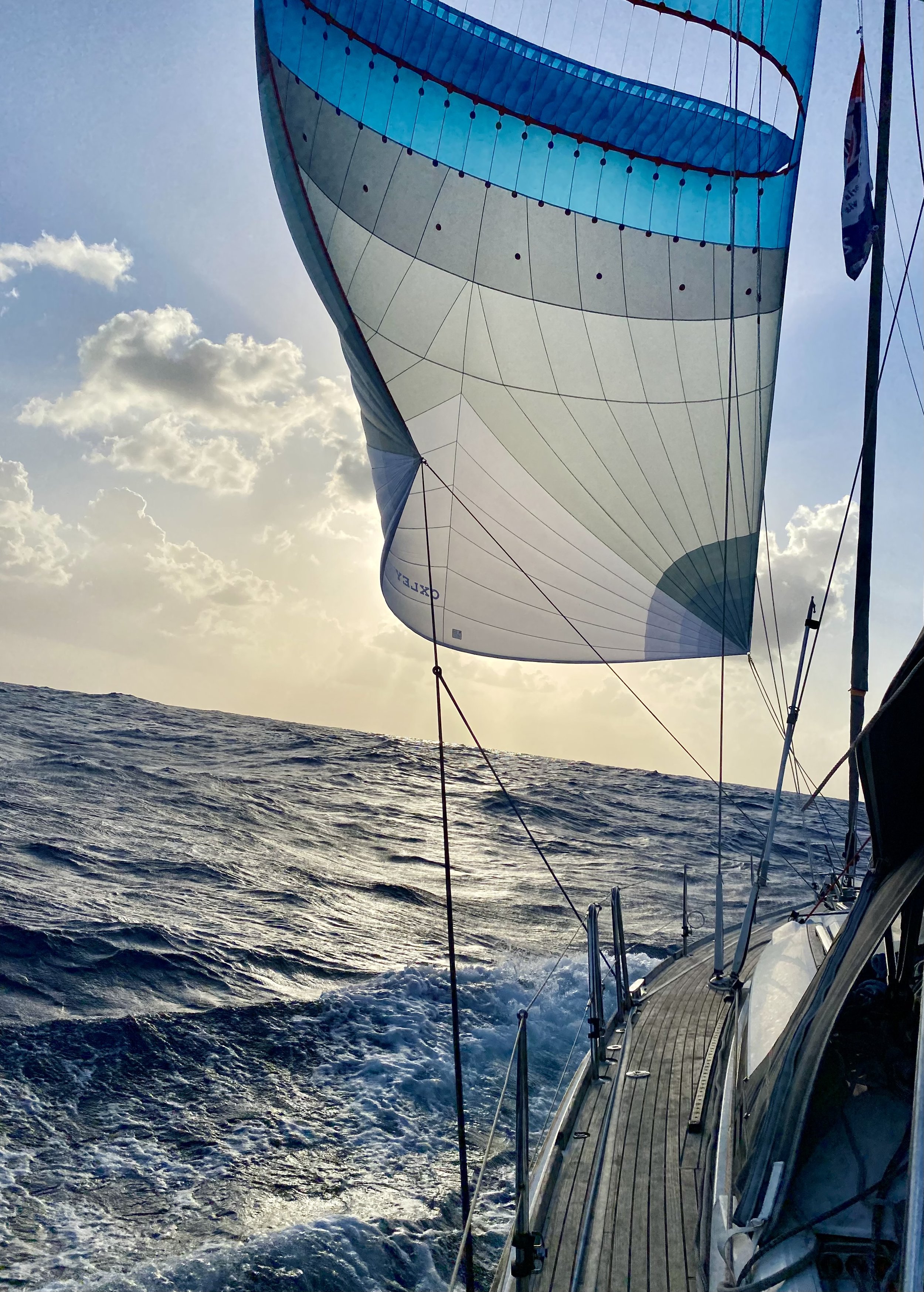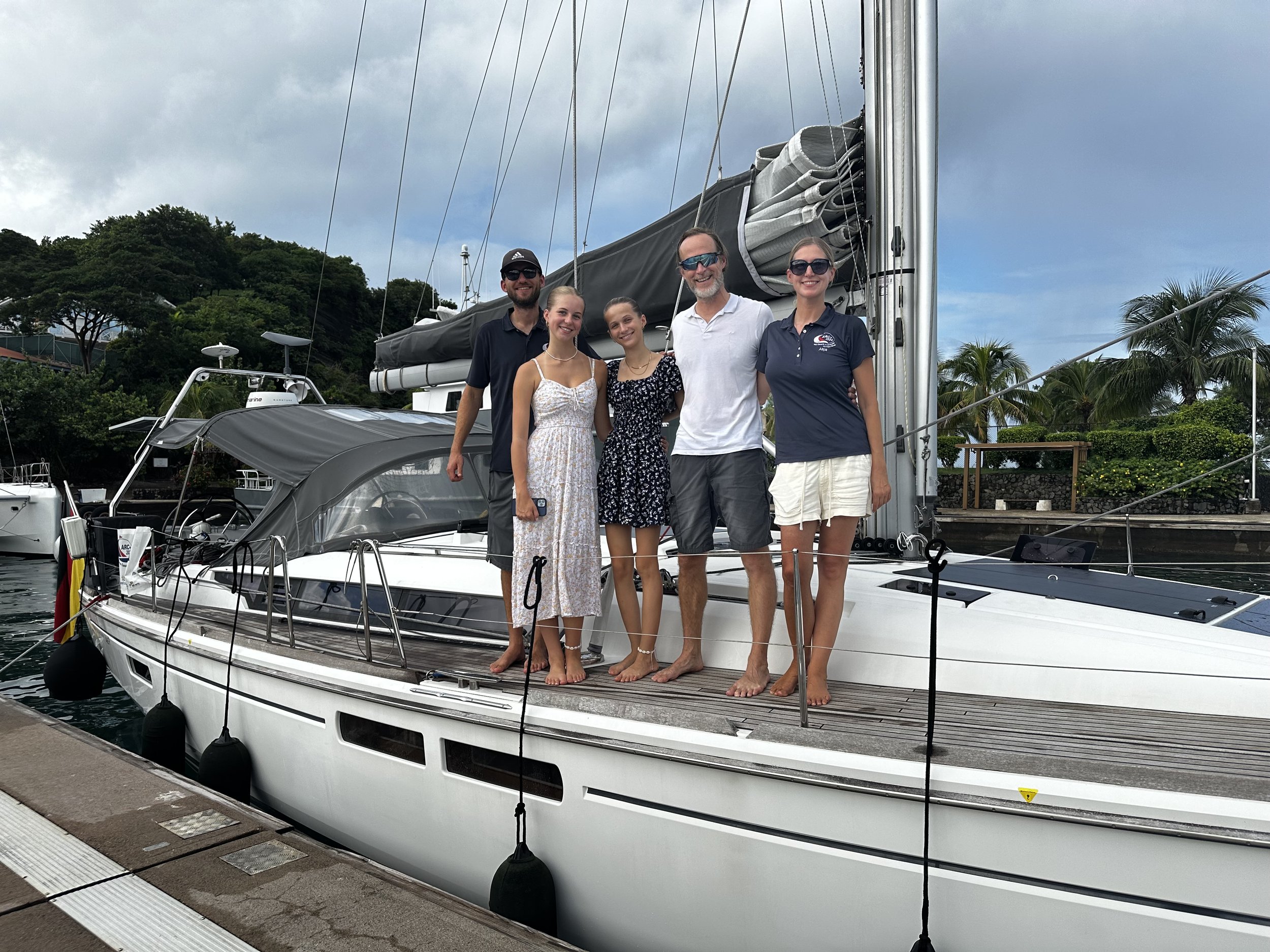Two weeks on the Atlantic Ocean
After ten days on the Atlantic, albatrosses accompany our ship. A thousand miles from land, their shadows hover above us, poking purposefully into the water. Flying fish jump away in all directions. Entire swarms emerge from the ocean. They are shimmering white in the sunlight.
We are hanging on our safety lines on the foredeck and watch the hunting scenes, when I spot a tuna in the waves. Just below the surface, larger fish join in the hunt. We shift our fishing rod but don't catch any tuna. Even without a catch, it's great to be a guest in this secluded world.
We are now in the Caribbean. We conquered the Atlantic from Mindelo (Cape Verde) to St. George (Grenada) in 13 days, 22 hours and 35 minutes and completed the second, larger part of the crossing. Sailing 2235 nautical miles on the ocean alone with five people is an adventure: Will one of us get seasick? Can we sleep on the rolling ship? Are we heading into a calm, or into stormier weather? Is the autopilot holding, and the sails we had repaired in Mindelo? Will we keep it up? The bottom line is that the tour wasn't always easy, but we could have added another week.
What I learned during this time:
Competitive spirit: ON
The Asja is not a racer. Before the Atlantic Crossing, the regatta aspect didn't play a role for me. At the ARC+, the participants compete in ten categories. When we narrowly miss the top 3 in Cruising B on the way to Cape Verde, it awakens the fighting spirit in all of us. Now, we want to finish well, whatever that means.
Things get even better on the big jump. Because we ride the fast Oxley Bora Parasailor for a week, we climb to 23rd place out of 94 in the overall ranking. The better we do (unexpectedly), the more fun the rally is. Every few hours I check our ranking on the YB Races app. Maybe we can kick SY Isabel out of the top 3 in our group?
We fly the Parasailor for more than a week.
Days run into each other, but we have a plan
Shortly after our departure from Mindelo on November 22, Alex creates a plan of our shifts to look after our boat. Because of school, the children are given a set time to watch. For the rest of the day and night, we adults take turns every 3 hours.
On the Atlantic, where the days flow into one another and we forget whether it is Tuesday or Wednesday, the plan determines our daily routine. It's hard when the alarm goes off at 3 a.m. for the least favorite of all night shifts. But it doesn't help: stand up, keep an eye on other ships, the sails, the course, look for squalls on the radar and avoid them...
Most of the time there isn't much going on and I read on my Kindle. At the moment, there is no other ship in sight. The sails are good and in my book, dragon riders are fighting against evil. A hard blow hits my ear. I cringe, try to settle back to reality, where something knocks on the floor. I turn on my headlamp and let it shine towards the sounds. A flying fish, who has just slapped me in the face, is hopping clumsily across the teak deck. I grab the fish with a towel and throw him back into the sea.
Flying fish as constant companions
Cheilopogon melanurus look like the child of a bird and a sardine. Everywhere along our route, Atlantic flying fish catapult themselves out of the water. Thanks to their wing-like extended pectoral fins, they fly 10, 20 meters over the ocean. And they bombard the ships. They land on sailors laps, hit the steering wheel and fly straight into the galley of SY Yggdrasil.
If they make it back into the water, the only evidence of them is a few scales glistening on the bottom or on the bimini. If not, you have to collect the dead fish in the morning. “You are unsuccessfully applying to be on our menu,” writes an ARC participant in the chat. You could eat them, of course, but there's not much to flying fish.
Louisa is gutting our first Mahi Mahi.
We dream of tuna ceviche, sushi and steak
… but don’t fish a tuna.
Self-catering with fish is a challenge. We are well equipped with two rods and squid baits in different sizes. The fish are biting too, that's not our problem, but we get less than half of them on board. They rather pull on the hook with the force of a shark - until we are left with only a piece of fishing line. Or we catch Saragasso seaweed or smaller fish that we take of the hook and throw back into the sea.
In the end, we catch a few fish, including a 2.5 kilogram Mahi Mahi, which Louisa guts and fillets… a highlight of our tour.
Seagrass in the middle of the Atlantic
Champagne sailing vs wave crests
While in November, a pleasant trade wind pushed us across the Atlantic, the weather changes on December 1st. A high pressure area on the way to the Azores brings fresh to strong winds from the east-northeast. Towards the evening, the wind is blowing at 20-24 knots, with gusts of 30.
The Asja surfs three or four meter waves and reaches speeds beyond her comfort zone (maximum 16.8 knots). Above us, the Oxley Bora is billowing like a huge kite... hopefully it will hold. The autopilot groans and clicks - hopefully it won't let us down again.
The mood changes further when the World Cruising Club reports a man overboard on December 2nd. A 33-year-old Swede fell into the sea on the VO70 Racing Yacht Ocean Breeze before dawn. With these wave crests, far away from land, it is pure horror. Although the MOB was wearing a safety vest with an AIS signal, a search operation with three ships remains unsuccessful. The search is called off at night.
For us, as participants of the sister rally, it is impossible to simply brush aside the tragedy. Because the weather is getting worse, we will only be using safety lines from now on - in any case during the night shift and on the foredeck.
We manage to avoid the dreaded squalls, in which the wind increases by at least 40%. They only touch us peripherally. We still take the Parasailor down and fall behind in the rankings.
We cross the finish line in Grenada on December 6th at 7:14 local time - as the first German ship :-) and place 29 in the overall ranking. We all barely slept. After weeks surrounded by blues and grays, with heavy rain at the end, colors explode before our eyes: a rainbow stretches over the pastel houses of the Carenage of Saint George. The ARC + team in their yellow shirts serves extremely strong rum punches and a gift basket with all kinds of specialties that can be made from nutmeg. To celebrate the day, Stella and Louisa quickly put on their summer dresses. “You don’t look like you just crossed the Atlantic,” says a captain who has arrived on Thursday: “You look more like you came from a garden party.”
We almost didn’t sleep, but finally, we’re in the Caribbean.
modern marina in the south of Saint George
beautiful complex with pool, bars, restaurants and shops
Very good showers/toilets with large individual cabins
slow service in the restaurant






